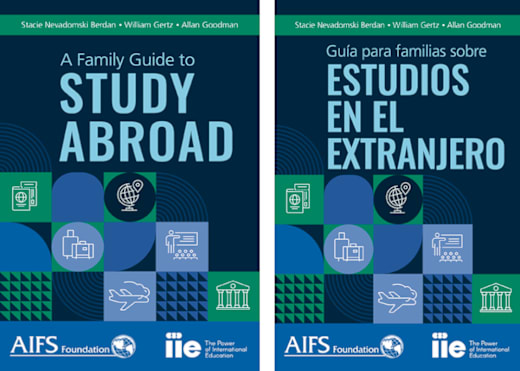
14
When a student decides to study or intern abroad, it’s an exciting milestone not only for them but for their entire support network—parents, family, and all those cheering them on from home. Sending a loved one halfway across the world can bring a mix of excitement and questions. That’s why we’re pleased to share insights from a parent who has just been through it! AIFS Abroad student Stephanie recently participated in our May Term program in Florence, Italy. In this Q&A, her mom Doris offers a firsthand look at her own experience—from preparing for her daughter’s journey to watching her grow and thrive abroad.
Whether you’re supporting a student who’s already interested in going abroad or is just beginning to explore the idea, we hope this perspective helps you imagine the incredible impact an education abroad experience can have on their college career and beyond.
Read on to hear from Doris about her experience as a parent whose child embarked on a study abroad program.
1. What aspects of the study abroad program surprised you the most, and what do you wish you had known beforehand?
“One of the most surprising aspects of Stephanie’s study abroad program in Florence was how immersive the experience was. I expected it to be mostly about attending classes and sightseeing, but I was amazed at how quickly she adapted to the local culture and lifestyle. The way she described the Italian approach to meals—long, leisurely dinners with friends—was something I hadn’t anticipated. I wish I had known just how important it would be to embrace that slower pace of life; it seems to enrich the experience significantly.
Additionally, I was surprised by the level of independence she gained. Stephanie mentioned how much freedom she had to explore not just Florence but other parts of Italy and Europe. I didn’t realize how essential that exploration would be for her personal growth.
Lastly, I wish I had understood more about the academic differences. she talked about how classes were structured differently than back home, with a greater emphasis on participation and hands-on learning. Overall, her experience sounds incredibly enriching, and I’m so proud of how she embraced all these surprises!”
2. Were there any specific challenges your student faced while abroad that you were not prepared for? How did you handle those challenges as a parent?
“As Stephanie’s mother, I was definitely surprised by some of the challenges she faced during her study abroad experience in Florence. A few things in particular stand out:
- The language barrier was more difficult than I anticipated, especially in the beginning. I know she studied Italian before going, but actually being immersed in it 24/7 was overwhelming at first. I wish I had encouraged her to practice more.
- Homesickness hit harder than expected, especially around holidays and family events. I didn’t realize how tough it would be for her to miss things like her sister’s birthday and our annual family vacation. We tried to include her via video calls, but it wasn’t the same. In retrospect, I wish we had planned a visit to see her midway through her program. We met in the South of France for a weekend with her grandfather but I wish I got her siblings and father to come surprise her. It was very hard for them not to see her as she left directly after college and never came home before Florence.
- Managing finances abroad was trickier than anticipated. Dealing with exchange rates, international bank fees, and budgeting in a foreign currency took some getting used to. I wish we had done more research on the most cost-effective ways to access money abroad.
- Balancing travel opportunities with academic responsibilities was challenging. I know she wanted to take advantage of being in Europe to see other countries, but she also needed to focus on her studies. Finding that balance was harder than I expected it to be for her.
As a parent, handling these challenges from afar wasn’t easy. I tried to be supportive by listening when she needed to vent, offering advice when asked, and reminding her of the amazing opportunity she had. But I also had to step back and let her problem-solve on her own – that was probably the hardest part for me! Overall though, seeing how she grew and matured through overcoming these obstacles made me incredibly proud. The experience taught us both a lot about resilience, independence, and cross-cultural adaptation.”

3. In hindsight, what advice would you give to other parents about supporting their student during their study/intern abroad experience?
- “Encourage independence while staying connected. It’s important to let your student navigate challenges on their own, but also be available for support when needed. Regular check-ins via video calls or messaging can help maintain connection without being overbearing.
- Discuss finances thoroughly beforehand. Create a realistic budget together, covering all expenses including travel, food, and emergencies.
- Ensure they understand how to access money abroad and manage currency exchange.
- Support their academic focus. While traveling is exciting, remind them of the primary purpose of their program. Encourage a balance between exploration and academic responsibilities.
- Plan a visit, if possible. Visiting towards the end of their program allows them to show you their temporary “home” and share their experiences firsthand.
- Remember, this experience is as much about your growth as a parent as it is about your student’s journey. Trust in their ability to navigate challenges and view this as an opportunity for both of you to learn and grow.”
4. Were there any safety concerns or cultural differences that you wish you had been more aware of before your student went abroad? How did you address these concerns?
“One major concern was the potential for petty crime, such as pickpocketing, which is common in tourist areas. I addressed this by encouraging Stephanie to follow travel safety tips, such as keeping valuables secure and being aware of her surroundings.
Additionally, the language barrier was a concern. While she had some Italian language skills, I realized the importance of being able to communicate effectively in emergencies. To address this, I suggested carrying a phrasebook or using translation apps to help bridge any communication gaps. Overall, staying informed and maintaining open communication with her helped alleviate these concerns while she was abroad.”
5. How did your communication with your student change during their time abroad, and what strategies did you find effective in staying connected?
“During her time in Florence, our communication evolved significantly. We established a regular daily video call, which became our anchor for staying connected, while using WhatsApp for quick daily check-ins and sharing photos, allowing for spontaneous communication. Following her Instagram stories gave me a glimpse into her daily life without feeling intrusive. I learned to respect her boundaries by giving her space and not expecting immediate responses, while also being mindful of the time difference when planning our communications. Including Stephanie in family events via video call helped her feel connected to home, and I made a conscious effort to listen more and offer advice only when asked, allowing her to problem-solve independently. Overall, finding a balance between regular check-ins and giving her the freedom to immerse herself in your experience was key to maintaining our connection.”
6. Did you have any concerns about your student’s health and well-being while they were abroad? How did you ensure they had access to appropriate medical care if needed?
“As Stephanie’s mother, I had some concerns about her health and well-being while she was in Florence, but I felt reassured knowing that her study abroad program had comprehensive support in place. [AIFS Abroad] provided her with international health insurance that covered both routine and emergency care, and they were proactive about ensuring students had access to local healthcare resources. When Stephanie twisted her ankle and it became swollen, I was relieved to hear that the program took immediate action to ensure she saw a doctor. They handled everything so well, making sure she received the care she needed. During our video calls, I appreciated hearing about how the program supported her, especially when it came to her physical and mental well-being. Knowing that she had such a strong support system allowed me to feel more at ease while she embraced this incredible experience in a new environment.”
If you are the parent, family member, or support system for a student interested in a global education opportunity like studying or interning abroad, we’re here to help.
AIFS has been a leading provider of study and intern abroad programs since 1964. With exciting and innovative educational opportunities around the globe, we have programs to meet every student’s interests and needs, while safeguarding their welfare and supporting them every step of the way.
A Family Guide to Study Abroad
All families are unique, but the importance and value of family support for students seeking to study abroad is shared. With A Family Guide to Study Abroad, the AIFS Foundation and Institute for International Education (IIE) provide valuable guidance on understanding the impact of and options for study abroad while updating information and tips to empower today’s students and their families to succeed. The guide speaks directly to families and provides helpful tips on topics like picking the right program, creating a budget, and staying safe when abroad. A Family Guide to Study Abroad is available in English and Spanish with print and digital versions to best fit your needs.
